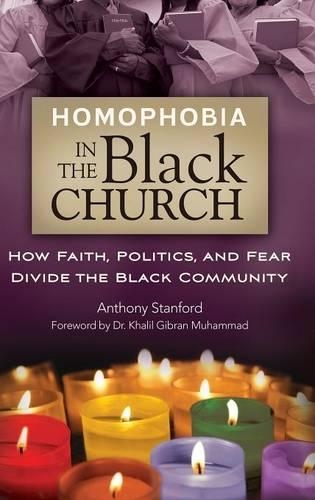
Homophobia in the Black Church: How Faith, Politics, and Fear Divide the Black Community
(Hardback)
Publishing Details
Homophobia in the Black Church: How Faith, Politics, and Fear Divide the Black Community
By (Author) Anthony Stanford
Foreword by Khalil Gibran Muhammad
Bloomsbury Publishing PLC
Praeger Publishers Inc
14th March 2013
United States
Classifications
Tertiary Education
Non Fiction
Politics and government
271.20973
Physical Properties
Hardback
232
Width 156mm, Height 235mm
567g
Description
This book explains how faith, politics, and fear contribute to the homophobic mindset within the Black Church and the African American community. Homophobia in the Black Church: How Faith, Politics, and Fear Divide the Black Community explores the various reasons for the Black Church's aversionand the general black cultural inflexibilitytoward homosexuality, same-sex marriage, and acceptance of the LGBT community. It connects black cultural resistance toward homosexuality to politics, faith, and fear; follows the trail of faith-based funding to the pulpit of black mega-churches; and spotlights how members of the black clergy have sacrificed black LGBTQ Christians for personal and political advancement. The author systematically builds his case, linking the reasons blacks are intolerant of deviation from acceptable sexual behavior to the 1960s struggle for racial equality, and tying longstanding black sexual mores to present day politics, social conservatism, and the lure of federal funding to black churches and religious and social organizations. He also spotlights specific homophobic black ministers and draws back the curtain on their alliance with White social conservatives and religious and political extremists to reveal an improbable but powerful union.
Reviews
This book does an excellent job of providing readers with a window into how diverse groups, who share antigay attitudes, beliefs, and behaviors, became unlikely bedfellows within the context of President George W. Bush's faith-based funding initiatives and politics to collaborate and support one another in obtaining these funds. It can be used in political science, sociology, community clinical psychology, social psychology, and multicultural diversity courses at the graduate level (LGBT studies, ethnic studies) and in theology and/or divinity courses. Additionally, practitioners can use this book to gain valuable insights into the sociocultural and sociohistorical dynamics that are inherent within African American communities. * American Psychological Association *
Author Bio
Anthony Stanford is a freelance writer and columnist in the Chicago, IL area.
